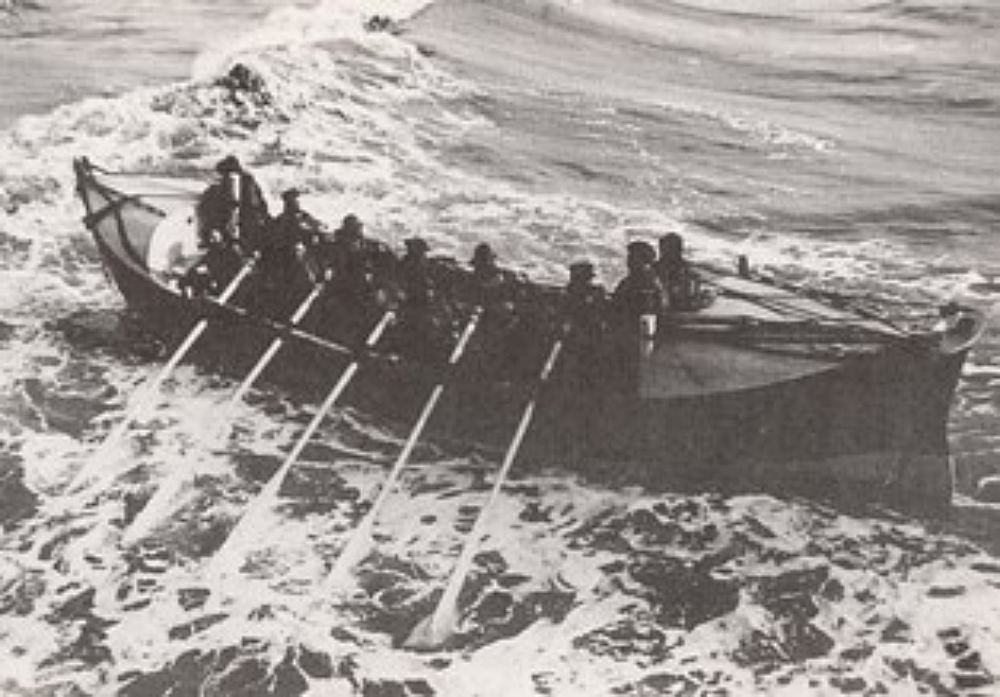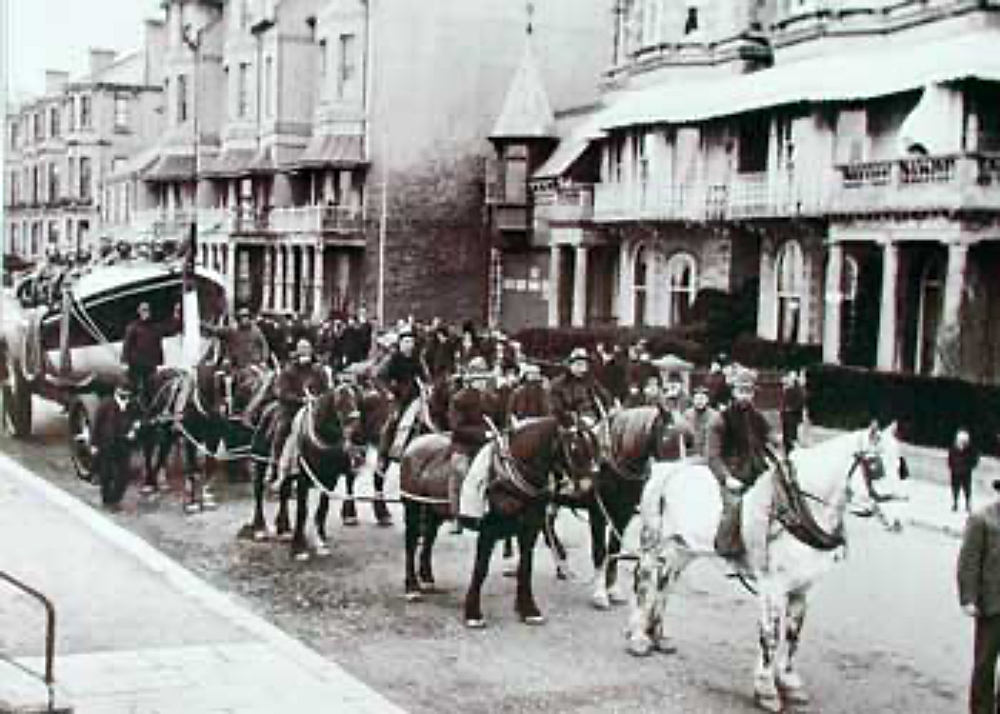Heroes of Worthing’s lifeboat
Many lying in the safety of their beds as the violent gale of December 6, 1896, rattled their windows were startled by the report of the gun summoning the volunteer crew of the Worthing lifeboat to their seafront station. The call was to the aid of a vessel seen “labouring in an apparently unmanageable condition” in the heavy seas off East Worthing. Freddie Feest recalls the drama and heroism of that night, so typical of the Victorian era, when Worthing had its own lifeboat station and the wives of volunteers who crewed the boat often waited in fear and dread that their loved ones might never return from their latest mission of mercy.

THE stricken Norwegian barque, Ophir, was already flying signals of distress and running for the shore when she was spotted by Mr Macgregor, chief officer of the coastguard at Lancing, and Mr Murphy, his counterpart at Shoreham.
Both sent out men on bicycles to give the alarm, but these were hardly needed as many on shore had by now seen the ship’s dire plight.
| CROWD PLEASER: The drama of the launching of the Henry Harris lifeboat always attracted crowds of onlookers to the beach |
The report of the signal gun summoning the voluntary lifeboat crew startled many Worthing residents out of their sleep and several hurried down to the beach.
Soon, a big crowd had gathered around the seafront lifeboat station, on the north side of the seafront road between West Buildings and Heene Terrace. As the volunteer crew prepared for their rescue mission, Councillor Butcher brought out his team of horses with the lifeboat carriage.
But for the furious sea breaking over the shingle barrier and making the Lancing road impassable, the horses would have towed the lifeboat, Henry Harris, to Lancing for launching. Instead, it had to be launched on the east side of Worthing Pier.
Although several hours before high tide, the breakers were already sufficiently powerful to make the launching extremely difficult, but, finally, the gallant little craft was floated and dashed into the billowing waves amid loud cheers.
The Shoreham lifeboat was less fortunate. The crew vainly tried to put to sea, but their boat was repeatedly beaten back by the strength of the waves.
Hoisting sail when they got beyond the breakers, the Worthing crew headed for the stricken Ophir, which was now being driven rapidly towards the shore.
The vessel was finally driven ashore a short distance to the east of the Three Horseshoes Inn at Lancing, but wreckage attached to the ship’s side prevented the lifeboat’s coxswain from rescuing the barque’s crew from the stern of the ship.
Instead, he was compelled to go to the windward side of the Ophir and endeavour to bring off the crew by means of lifelines.
At great risk to the safety of the lifeboat men, coxswain Lee succeeded in rescuing two of the Ophir’s crew, the steward – who was in a very exhausted condition, having been ill – and the mate.
The ship was by this time being battered by the breaking waves and it was necessary for the lifeboat crew to pull out to sea to prevent being dashed against the Ophir’s side. This would not only have destroyed their own little craft, but also probably led to the loss of their own lives.
Meanwhile, rockets, firing apparatus and lines, had been brought from Shoreham and set up on the beach opposite the wreck.
The first rocket was fired, but missed its mark, as also did the second, the lifeline in each instance being carried off by the very strong wind.
The drama heightened when it was realised that there were still eight men stranded on the severely damaged barque.
Amid loud cheering from onlookers – many having followed the lifeboat from Worthing – the third rocket flew clean over the vessel, but its line broke.
It was fourth line lucky. This time, it cleared the Ophir and was secured immediately. The rescue work could be re-started.
The rescue belt was hauled aboard and man after man was dragged ashore, though in a very exhausted state.
Cheer after cheer went up from the crowd of onlookers as several joined the rescuers in the water to help pull the sailors to safety. Some of the sailors seemed almost too fatigued to hold on. Some were turned completely upside down more than once as they were hauled ashore, while others were carried on the crest of a wave and thrown onto the beach with considerable force.

Every man was too exhausted to stand alone and all were helped to the nearby Three Horseshoes inn.
As the last man reached the shore, a loud and prolonged shout of relief went up.
Special credit was given to the coastguard and to the heroism shown by boatmen L. Davey, of Worthing, and William Dart, from Lancing.
The two men had displayed bravery of the highest order when a crew member of the barque slipped from the breeches buoy while being brought ashore. It demonstrated just how difficult and dangerous rescues from the sea can be.
The man, his limbs numb with cold and exposure, was hanging face downwards. His hands had become entwined in the travelling block and one turn of the rope was tight around his neck.
Davey and Dart, paying little heed to their own safety, risked their own lives by rushing into the violent surf without hesitation. They saved the crewman from certain death by strangulation, if not drowning.
A few days later, Messrs Patching and Co held an auction on the beach. Under the hammer went the sad-looking wreck of the Ophir and what little remained of its contents.
With the headline “Ships are cheap today”, the following issue of the Worthing Gazette reported that the sale of the Ophir and its entire contents had fetched a total of only £34!
Ophir Road, on the seafront at East Worthing, was named in memory of the ship, and the wreck of the Ophir featured in the official service record of Worthing’s lifeboat station, which, having been opened in 1853, stayed in service until 1930.
During its 77 years’ active service, the lifeboat station and its volunteer crews saved 58 lives in12 rescues. It also launched its boats for countless other rescue operations, where crews did not need to be taken ashore.